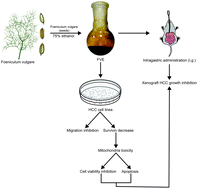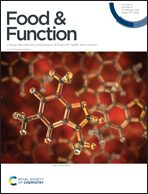Foeniculum vulgare seed extract exerts anti-cancer effects on hepatocellular carcinoma
Abstract
Hepatocellular carcinoma (HCC) is one of the most common malignant tumors. The prognosis of HCC is very poor due to the absence of symptoms and a lack of effective treatments. Studies have shown that various Foeniculum vulgare (fennel) extracts exhibit anti-cancer effects on malignant tumors such as skin cancer and prostate cancer. However, the anti-tumor activity of Foeniculum vulgare and its underlying molecular mechanisms towards HCC are unknown. Here, we provide fundamental evidence to show that the 75% ethanol extract of Foeniculum vulgare seeds (FVE) reduced cell viability, induced apoptosis, and effectively inhibited cell migration in HCC cells in vitro. HCC xenograft studies in nude mice showed that FVE significantly inhibited HCC growth in vivo. Mechanistic analyses showed that FVE reduced survivin protein levels and triggered mitochondrial toxicity, subsequently inducing caspase-3 activation and apoptosis. Survivin inhibition effectively sensitized HCC cells to FVE-induced apoptosis. Moreover, FVE did not induce a decrease in survivin or apoptotic toxicity in normal liver cells. Collectively, in vivo and in vitro results suggest that FVE exerts inhibitory effects in HCC by targeting the oncoprotein survivin, suggesting FVE may be a potential anti-cancer agent that may benefit patients with HCC.



 Please wait while we load your content...
Please wait while we load your content...